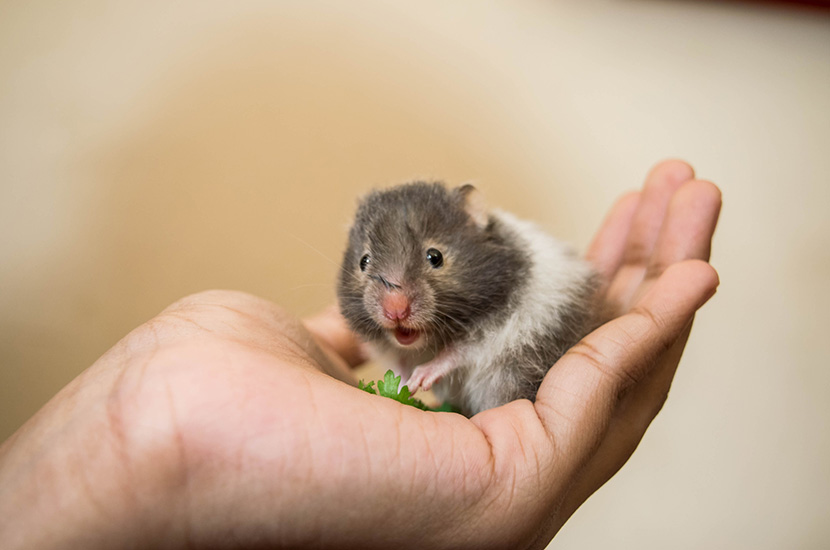by Jessi O’Connell, CVT
Photos and edited by Susan Horton, DVM
General Characteristics
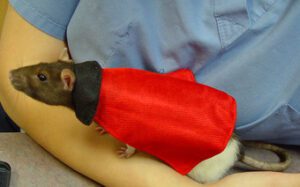 Pet rats are of the species Rattus norvegicus. These nocturnal rodents are characterized by elongated bodies, short fur, small eyes and ears, and hairless tails. Pet Fancy rats come in six different varieties. These include Standard, Rex, Hairless, Satin, Dumbo, and Tailless. There are also various colors and body markings recognized by the AFRMA. From the common Pink-eyed white (albino), and standard hooded, to the beautiful Siamese, and everywhere in between. With all the different varieties it may be a shock to hear they all fall under the species Rattus norvegicus, commonly known as the Norway or Brown rat. Rats can make wonderful pets because they are highly social, intelligent, and affectionate. Due to their social and affectionate behavior they should be housed in same sex or altered sex groups. Rats should also get at least 30 minutes of supervised play time outside of their cage to interact with you! Always remember that when handling rats you must support their chest as well as their back.
Pet rats are of the species Rattus norvegicus. These nocturnal rodents are characterized by elongated bodies, short fur, small eyes and ears, and hairless tails. Pet Fancy rats come in six different varieties. These include Standard, Rex, Hairless, Satin, Dumbo, and Tailless. There are also various colors and body markings recognized by the AFRMA. From the common Pink-eyed white (albino), and standard hooded, to the beautiful Siamese, and everywhere in between. With all the different varieties it may be a shock to hear they all fall under the species Rattus norvegicus, commonly known as the Norway or Brown rat. Rats can make wonderful pets because they are highly social, intelligent, and affectionate. Due to their social and affectionate behavior they should be housed in same sex or altered sex groups. Rats should also get at least 30 minutes of supervised play time outside of their cage to interact with you! Always remember that when handling rats you must support their chest as well as their back.
Anatomically, rats have open inguinal canals, a diffuse pancreas, a divided stomach, a large cecum, and an os penis. Rats do not have gallbladders and cannot vomit. Albino rats have poor eyesight, and all rats depend on whiskers and scent for sensory input, sometimes weaving their heads back and forth to focus on objects. The red brown Harderian gland is a lachrymal gland located behind the eyeball; this gland produces a lipid and red porphyrin-rich secretion. In illness, red tears may overflow and stain the face and nose, and can also be spread or caked on wrists, ears and fur. There is no blood in this tear film and the red crusts will fluoresce bright under ultraviolet light. As rats age white hair coats can take on a yellowish cast.
Because rats are social and need companionship, they should be maintained in same sex or altered sex groups.
Proper Housing
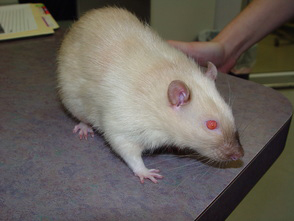 The minimum cage size for a single adult rat is (24”x 24” x 14” high). An escape proof wire cage with a solid plastic or metal floor is optimal. Aquariums should only be used as nursing cages or hospital cages, because ammonia tends to build up rapidly in them. Rats should never be exposed to a wire floor, because pressure sores can form. These sores can lead to pododermatitis, which is an ulcerative condition of the feet commonly known as bumble foot. Their cages should have plenty of places to both sleep and hide. Some great options are hide boxes and hammocks. Rats are highly intelligent animals and need to have stimulation in their cages. They frequently enjoy running in wheels, and should have a safe solid floored wheel available in their cage. Toys don’t need to cost a lot of money, card board boxes and shredded paper, go over very well. Also they should always have access to wood chews in their cage. As their teeth are constantly growing and without a way to wear them down it can lead to malocclusion of the teeth.
The minimum cage size for a single adult rat is (24”x 24” x 14” high). An escape proof wire cage with a solid plastic or metal floor is optimal. Aquariums should only be used as nursing cages or hospital cages, because ammonia tends to build up rapidly in them. Rats should never be exposed to a wire floor, because pressure sores can form. These sores can lead to pododermatitis, which is an ulcerative condition of the feet commonly known as bumble foot. Their cages should have plenty of places to both sleep and hide. Some great options are hide boxes and hammocks. Rats are highly intelligent animals and need to have stimulation in their cages. They frequently enjoy running in wheels, and should have a safe solid floored wheel available in their cage. Toys don’t need to cost a lot of money, card board boxes and shredded paper, go over very well. Also they should always have access to wood chews in their cage. As their teeth are constantly growing and without a way to wear them down it can lead to malocclusion of the teeth.
Bedding
Pine and Cedar bedding should NEVER be used as bedding material for rats. The phenols (natural aromatic chemicals) found in these two types of wood are toxic. They have been proven to cause irritation to their respiratory tract, and can lead to respiratory disease. Safe options for bedding in rat cages include fleece fabric, recycled newspaper bedding, and aspen. The bedding should be spot cleaned daily and completely changed at least twice weekly. With time and patience rats can also be litter trained (feces) much like a cat.
Most rats will allow you to pick them up by placing the hand firmly over the back and rib cage, or by scooping them up in both hands. The head can be restrained with the thumb and forefinger behind the jaws. Scruffing the loose skin at the nape of the neck can help restrain and active rat, but many rats object to this.
Bedding
Pine and Cedar bedding should NEVER be used as bedding material for rats. The phenols (natural aromatic chemicals) found in these two types of wood are toxic. They have been proven to cause irritation to their respiratory tract, and can lead to respiratory disease. Safe options for bedding in rat cages include fleece fabric, recycled newspaper bedding, and aspen. The bedding should be spot cleaned daily and completely changed at least twice weekly. With time and patience rats can also be litter trained (feces) much like a cat.
Most rats will allow you to pick them up by placing the hand firmly over the back and rib cage, or by scooping them up in both hands. The head can be restrained with the thumb and forefinger behind the jaws. Scruffing the loose skin at the nape of the neck can help restrain and active rat, but many rats object to this.
Sexing
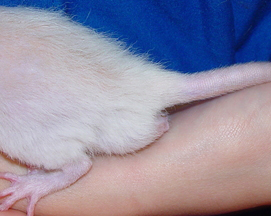 Gender differentiation with rats is very simple, even from early on. As males have a scrotum and an anogenital distance twice as long as a female. Males should be separated from females at five weeks of age to prevent pregnancy. Spaying and neutering are both very beneficial. Neutering can lower testosterone as well as prevent testicular tumors. And spaying prevents both pregnancy and is thought to lower the risk of developing mammary tumors, which are very common in female rats. It also allows both genders to live together in the same cage.
Gender differentiation with rats is very simple, even from early on. As males have a scrotum and an anogenital distance twice as long as a female. Males should be separated from females at five weeks of age to prevent pregnancy. Spaying and neutering are both very beneficial. Neutering can lower testosterone as well as prevent testicular tumors. And spaying prevents both pregnancy and is thought to lower the risk of developing mammary tumors, which are very common in female rats. It also allows both genders to live together in the same cage.
Diet
Rats are omnivores meaning that they eat both plants and animals. This is very important to keep in mind when feeding your pet rat. The staple of their diet should be a commercially available pelleted diet such as Oxbow, Mazuri, or Harlan Teklad. Fresh vegetables, lean meats such as chicken, and very small amounts of fruit can be added for a variety. Seed based diets should be avoided at all costs; they are both fattening and most importantly nutritionally deficient. Fresh water should be given daily and using a glass water bottle is preferred over plastic. The reason this is favored is that you can’t properly clean plastic bottles. And the glass bottles can be run through the dish washer weekly to remove any bacteria that could be growing. Keeping a close eye on your pet rat’s appetite is very important; it also can be very difficult. It is recommended that you purchase a gram scale and weigh them at least once weekly. The first sign of illness in rodents is usually weight loss.
Interesting Facts
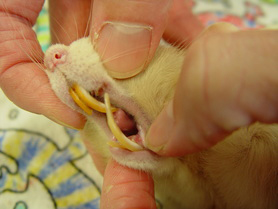 In general rats tend to have very poor eyesight, albino rats in particular. Because of this it is not uncommon to see them swaying their heads in an attempt to focus on an object. Rats also lack a gall bladder and the ability to vomit! Rats are nocturnal but easily adjust their sleep schedule so that they are active when you’re home.
In general rats tend to have very poor eyesight, albino rats in particular. Because of this it is not uncommon to see them swaying their heads in an attempt to focus on an object. Rats also lack a gall bladder and the ability to vomit! Rats are nocturnal but easily adjust their sleep schedule so that they are active when you’re home.
Rats can have severe dental problems. Difficulty eating or dropping food may be signs that your rats teeth are misaligned. Infection or trauma can cause the incisors not to meet properly. Since these incisors continually grow, they will become quite long. We can help with this problem.
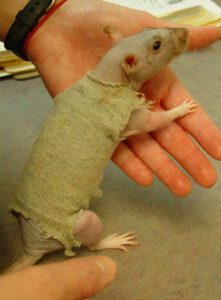 What You Need to Know
What You Need to Know
- Life Expectancy is two to three years
- Room temperature 65-80 degrees F (average 72F) with 40-70% humidity is suitable environment
- Keep housing clean to minimize respiratory disease risk.
- Dogs, cats, and ferrets are predators.
- Basically nocturnal, but can be active during the day as well.
- Monitor feces and urine output
- Need at least 30 minutes each days for an exercise/play with owner.
- Bite aggressively only if restrained against their will.
- Often difficult to litter-train (fecal).
- Feed pelleted diet, not seed diet.
- Monthly examinations of weight, teeth, nails, and lump checks recommended.
For more information on health problems click here.
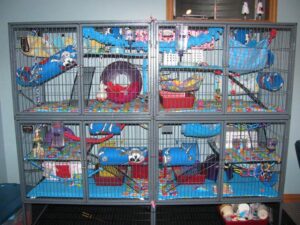
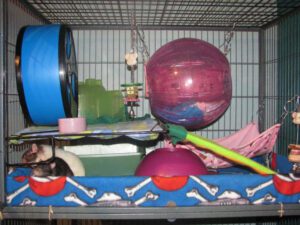
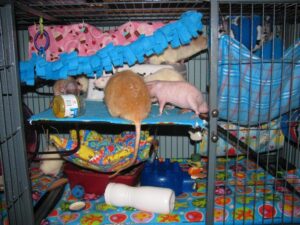
At Chicago Exotics Animal Hospital, we do routinely spay and neuter them to ensure a more peaceful colony. Some people suggest spaying may help reduce the incidence of mammary cancer as well. Mammary cancer is a common problem with rats. If a lump appears anywhere on your rat’s body, please have us check it out. These masses can grow to amazingly large sizes quite quickly. They are usually safe and easy to remove when they are small. Feel free to ask us about these services.
For more information on health problems click here.
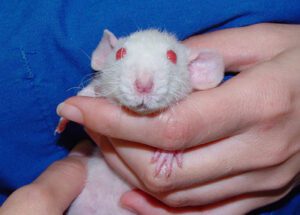
If you have any questions, please feel free to call us at (502) 241-4117.

